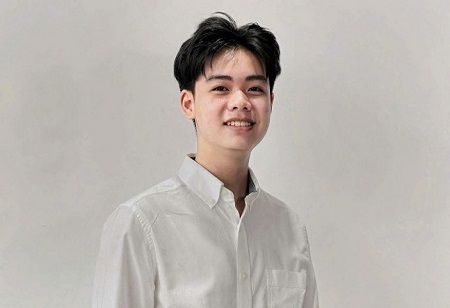A Vietnamese high school student, Nguyen Duc Bao Khoi, won an 80% scholarship worth $307,000 to study neuroscience at Johns Hopkins University. This is after he changed his mind from math education to specializing in English.
Khoi, a 12th grader at Ho Chi Minh City's High School for the Gifted, received the life-changing news in late December. "I was half-asleep when I opened the email. Then I saw the congratulations and the 80% scholarship. I couldn't believe it. My mom kept asking if it was real, and then my whole family cheered", he shared.
Johns Hopkins, ranked sixth in the U.S. and first in biomedical sciences by U.S. News & World Report, offered Khoi this opportunity with an acceptance rate of just 7%. The university’s annual tuition of $64,730, alongside living costs of $90,000, makes the scholarship a significant relief for Khoi’s family.
According to Khoi, this is because the application was solid and presented him with his achievements in academics, research projects, extracurricular involvement, and compelling essays reflecting his passion for biology and medicine.
"To be honest, since I was little, my parents told me medicine is a challenging field. At first, I saw it as a conquest, but later I realized it's a noble profession", he explained.
Initially, Khoi excelled in math, chemistry, and biology during middle school. In high school, he changed his focus to English and enrolled in the English specialization class at the High School for the Gifted, part of Vietnam National University, Ho Chi Minh City. He thought that English was a must for studying abroad and adapting to life overseas.
Khoi self-studied the 11th-grade curriculum in his 10th grade and completed high school-level knowledge ahead of schedule. During his school hours, he also prepared for the SAT, took AP courses, and engaged in extracurricular activities and received a GPA of 9.8, an IELTS score of 8.5, a 1560/1600 SAT score, and top scores in AP math and chemistry.
The two research projects made his application substantial. In his 10th grade, Khoi worked hands-on in Vietnam National University labs. He became a member of a research group in the Stem Cell Institute and had a summer research project at the Institute of Applied Materials Science the following year as part of 11th grade. The topic was the antioxidant, anti-inflammatory, and antibacterial activities of fishtail palm (Caryota mitis).
Reflecting on the challenges of his research, Khoi admitted that he faced struggles at first. "I didn't even know what a fishtail palm was at first. There were days I spent from 8 a.m. to 5 p.m. peeling, mixing chemicals, and running tests that kept failing", he recalled. Despite long commutes and late nights, Khoi persevered. "When I felt like giving up, I reminded myself to push a little further. I didn't want to regret not giving my all".
The personal essay also played a significant role in his acceptance. He had prepared it months in advance but then rewrote it five days before the submission deadline under the guidance of his teachers. His essay was on silent contributions to society, inspired by his mother's fingerprint—a metaphor for individuality and impact.
Khoi described how his mother, who has dry, peeling skin that prevents her from using her fingerprint for simple tasks like unlocking doors, leaves her mark by selfless contributions to her family and community. He connected that imagery with the volunteer experience he had at an orphanage in the Mekong Delta, where he learned how much value could be placed on small, unnoticed acts of kindness.
Tran Nam Dung, High School for the Gifted deputy principal, called Khoi hardworking and intelligent. "His determination to progress and perfection is remarkable", he said.
Khoi was almost sure that he would study at Johns Hopkins in fall 2025. He still pays much attention to his preparation for national high school graduation exams and for applying to Ho Chi Minh City Medicine and Pharmacy University as an alternative.
Khoi’s journey, marked by determination, adaptability, and a passion for learning, reflects not only his academic prowess but also his commitment to making meaningful contributions to society.

